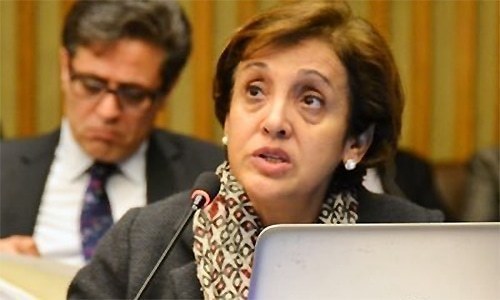ISLAMABAD: Top Pakistani and US military commanders blamed each other on Thursday for not doing enough to stop cross-border terrorism.
The two-day visit of United States Central Command (Centcom) Commander Gen Joseph Votel, in which he held a series of meetings with senior Pakistani military commanders, including Army Chief Gen Qamar Bajwa, reinforced the perception that Pakistan and the US had not been able to narrow their trust deficit despite a series of high-level meetings.
Gen Votel’s trip, which was his fourth to Islamabad, is believed to be a preparatory visit for the upcoming trip of US Defence Secretary James Mattis, who is expected next month. Besides Gen Bajwa, the Centcom commander also met Chairman of the Joint Chiefs of Staff Committee Gen Zubair Hayat and Director General of Inter-Services Intelligence Lt Gen Naveed Mukhtar.
Bajwa says Islamabad’s efforts for peace in Afghanistan are not being reciprocated
The ISPR said Gen Bajwa told Gen Votel that Pakistan’s committed efforts for peace in Afghanistan were not being reciprocated. He pointed towards the latest cross-border attack on a Pakistani post in Bajaur in which two soldiers were martyred.
After the attack, the military had called for “more efforts” by all stakeholders in Afghanistan, meaning both Nato’s Resolute Support Mission and Afghan security forces, for elimination of terrorist sanctuaries in Afghanistan and effective border security.
Meanwhile, Gen Votel, according to a US Embassy statement, “stressed the Administration’s message that Pakistan must prevent all militants from operating within and across its borders”. It was essentially the reiteration of the demand for action against the alleged “safe havens”.
Pakistan and the US have had a series of meetings to bridge their differences since President Donald Trump’s Fort Myer speech on the new US policy for the region and Afghanistan in which he bitterly criticised Pakistan for ‘insincerity’ in fight against terrorism while getting billions of dollars from America. The harsh language had aggravated the strains in relations.
Foreign Office spokesman Dr Mohammad Faisal, speaking at the weekly media briefing, said efforts were continuing “to bridge the gap between the perceptions of the two countries in the wake of President Trump’s South Asia and Afghanistan policy, and to arrive at a consensus on moving forward and exploring avenues of cooperation between both sides”.
He noted that Pakistan was “actively engaged in dialogue with the US at all levels, and believes that dialogue is the best way forward to enhance cooperation between the two sides”.
In contrast to Pakistan’s view about the high-level engagements as an effort for finding common ground for progress in ties, the US says the meetings were for “advancing the Trump administration’s South Asia policy goals”.
Gen Votel, while meeting military and intelligence leaders, emphasised the importance of improved Pak-Afghan relations, and the need for strengthened border security, including measures to coordinate military operations along both sides of the border.
“Votel underscored the vital role Pakistan can play in facilitating a peace process in Afghanistan and in bringing stability and security to the region,” the embassy said.
Dr Faisal in his media briefing highlighted the absence of Kabul’s writ on Afghan territory that was allowing terrorists to carry out their activities.
“The presence of terrorist safe havens in Afghanistan is an established reality. The report of US Special Inspector General for Afghanistan Reconstruction itself confirms that more than 43 per cent of Afghan territory is not under control of the Afghan government. This is alarming as it provides opportunity for all kinds of terrorist groups to use these as sanctuaries for terrorist activities. Afghanistan’s neighbours, including Pakistan, are seriously affected by this situation,” he said.
Published in Dawn, November 17th, 2017














































